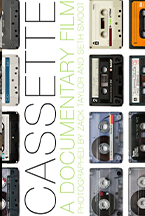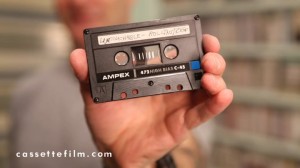CASSETTE

(The 18th annual Sound Unseen music film festival will take place Wednesday, November 8 through Sunday, November 12, 2017 in Minneapolis/St. Paul, MN. HtN has you covered with reviews so, stay tuned!)
Zach Taylor’s wistful documentary Cassette is an in-depth exploration of a recording format that lives on despite having been declared dead more than 20 years ago. It’s not just niche hipsters and nostalgic punk old timers that are keeping it alive.
It’s the concept of the “mix tape” in particular that endures. The mix-tape is an ideology. It’s the notion that we can curate what we hear and what we share with others. Lin-Manuel Miranda, whose work is undeniably cool but also inarguably mainstream, originally called his smash Broadway musical “the Hamilton Mix-Tape.”He later released a successful album of re-mixes and covers with that title. Taylor’s documentary is also a mix-tape. It’s a compilation of tributes to the format alongside more factual information about its history.
Cassette gives credit where credit is due. Cassettes were instrumental in, if not entirely responsible for the birth and emergence of hip-hip. Early DJs would play their sets on vinyl at parties. Their art was a moment in time, and it would have been lost to the ages if someone hadn’t lugged in a boom box and hit “Record” (or rather, “Record” AND “Play”).
Austin cult musician Daniel Johnston credits cassettes for saving his life. He believes that if he hadn’t been able to record and distribute his lo-fi chord organ dirges via tape, he never would have been signed to a music label. He says he would be dead or in an institution were it not for the people who bought and shared his first tape, “Jump/Yip Music.”
I will always remember the last time I made a mix tape. The year was 2003 and there was a boy I liked. As I had always done, I sat down to thoughtfully compile a selection of songs that I thought he would like or that summed up my feelings about him. I carefully decorated the insert and wrote out the track listing by hand.
When I proudly presented him with the tape, he thanked me and then said something along the lines of, “I might have a Walkman somewhere I can dig out.” He didn’t have a Walkman and I’m fairly sure he never listened to that tape. That day, it dawned on me that this was the new normal.

One person who doesn’t hold any nostalgia for the cassette is the man who invented it: Philips Electronics engineer Lou Ottens. They were originally designed as a user-friendly version of the reel-to-reel – a cumbersome and gargantuan set-up that the average citizen couldn’t really have in their home. Ottens agrees that it was revolutionary for its time. But he has always been in favor of technological advancement. In fact, Ottens was instrumental in developing CDs, the format that ended the reign of cassettes.
Now even CDs are obsolete. Music generally remains entirely digitized. What could be more portable and compact than something that lives in “the cloud”? But there are those, like Rollins, Mike Watt, and Thurston Moore, who cling to the tactile experience. They want to pull out a tape insert and read the lyrics or liner notes. They long for the artistry in making a mix tape for a crush or friend. There was love in spending hours in front of a dual tape deck. The process was painstaking. It involved finding the perfect collection of songs, and getting the timing exactly right so that the recipient didn’t have to rewind the tape when they flipped it over to side 2.
Rollins, in fact, has an entire room in his house dedicated to cassettes. They’re all neatly organized on shelves and in bins. He clearly spends hours in that room. He holds a favorite cassette in his hand and says, “You don’t throw this out. You take care of it. Because someone took that time out of their life that they can’t get back to make this tape for you.”
I still have a box of mix tapes made for me by friends and old loves. But mine lives in the back of a dusty closet. I no longer have a way to play them, but I can’t bring myself to throw them out. My children will have to dispose of them after I’m dead.
Ian McKay lost tons of money on the 1995 Fugazi album, Red Medicine, because they produced thousands of cassettes just as the CD was taking off. He doesn’t understand why anyone would want to release music that way today. “People are trying to be difficult,” he says. “I don’t see any reason to put out music on a format that you can’t play.” That’s not to say he’s not still fond of them. He still uses the cassette deck in his vintage Plymouth, the backseat littered with loose tapes. His car is a time capsule. It’s hard to let go of things that once brought you so much happiness, even if you are aware of the inherent irrationality.
Otten doesn’t “believe in eternity”, but he doesn’t begrudge those who still hold on to their cassettes. He answers Taylor’s questions with kind bemusement. This Documentary Mix-Tape is an enjoyable trip down memory lane – one that will certainly stir viewers of a certain age and educate young hipsters who are drawn to the world of analog. We can’t all be sensible Germans.
– Jessica Baxter (@tehBaxter)










